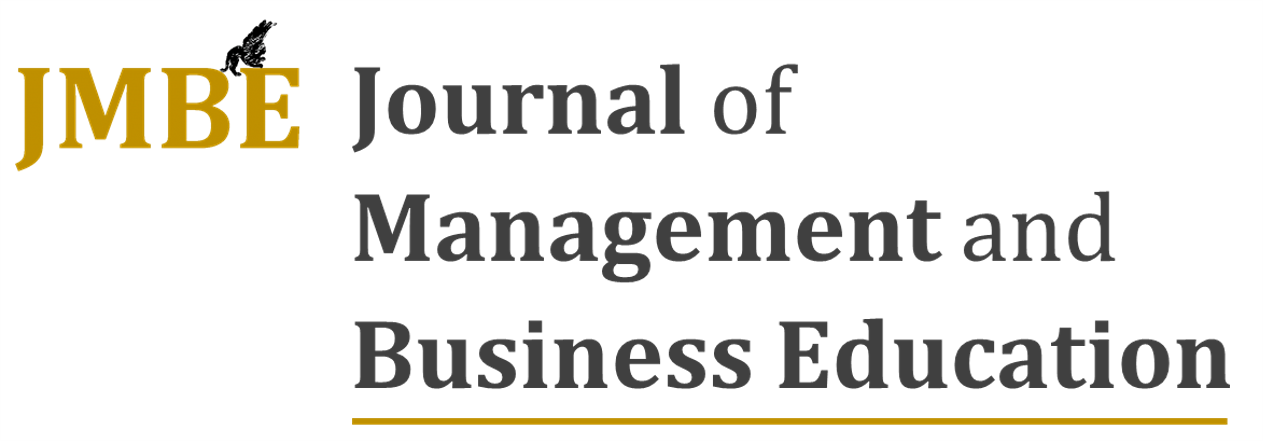Entrepreneurial education through junior enterprises
DOI:
https://doi.org/10.35564/jmbe.2018.0009Keywords:
Entrepreneurial education, Learning by doing, Entrepreneurial University, Junior Enterprise, Case StudyAbstract
In the context of the entrepreneurial university, the Junior Enterprise movement emerged as a learning aid to increase entrepreneurship and improve the employment prospects of university students from all areas of knowledge. In Spain, however, it has only had limited success with low creation and duration rates. What are the reasons for this lack of consolidation? What creation and consolidation problems does a Junior Enterprise encounter?
By means of a general study of the Junior Enterprise movement, our research group analysed the case of a Junior Enterprise attached to the University of Castilla-La Mancha (UCLM). The obtained results suggest that despite the unique characteristics of this type of firm, the problems are similar to those facing a small company created by a team of entrepreneurs in terms of its internal coordination, its ability to retain skilled personnel, or the difficult combination of technical and management skills that its members should have. It would be possible, however, to overcome the difficulties facing our students if the University were to play a more active role and act as a true enterprise incubator by providing specific training, for example.
Downloads
References
Aernoudt, R. (2004). Incubators: Tool for Entrepreneurship? Small Business Economics, 23(2), 127-135.
https://doi.org/10.1023/B:SBEJ.0000027665.54173.23
Bailetti, T. (2011). Fostering Student Entrepreneurship and University Spinoff Companies. Technology Innovation Management Review, October 2011, 7-12.
https://doi.org/10.22215/timreview/485
Barba-Sánchez, V. (2016, 24 de Noviembre). El papel del profesor en la tutorización y creación de las Junior Empresas", I Jornadas de la Red de Emprendedores, Albacete, UCLM.
Barba-Sánchez, V. & Atienza-Sahuquillo, C. (2017). Entrepreneurial motivation and self-employment: Evidence from Expectancy Theory", International Entrepreneurship and Management Journal, 13(4), 1097-1115.
https://doi.org/10.1007/s11365-017-0441-z
Barbero, J.L.; Casillas, J.C.; Wright, M. & Ramos, A. (2014). Do different types of incubators produce different types of innovations? The Journal of Technology Transfer, 39(2), 151-168.
https://doi.org/10.1007/s10961-013-9308-9
Batista-Canino, R.M.; Bolívar-Cruz, A.M. & Medina-Brito, M.P. (2016). Monitorización del proceso emprendedor a través del modelo de negocio, Innovar: Revista de Ciencias Administrativas y Sociales, 26(61), 83-102.
https://doi.org/10.15446/innovar.v26n61.57168
Beraza‐Garmendia, J.M. & Rodríguez‐Castellanos, A. (2015). Characteristics and effectiveness of university spin‐off support programmes, Academia Revista Latinoamericana de Administración, 28(1),14-44.
https://doi.org/10.1108/ARLA-09-2013-0139
Bueno, E. (2007). La Tercera Misión de la Universidad: El Reto de la Transferencia del Conocimiento. Revista de Investigación en Gestión de la Innovación y Tecnología, 41. Obtenido de https://www.madrimasd.org/revista/revista41/tribuna/tribuna2.asp
Calvo, N.; Rodeiro-Pazos, D. & Fernández-López, S. (2017). Science and Technology Parks (STPs) as Accelerators of Knowledge-Intensive Business Services (KIBS). A Case Study." International Journal of Business and Globalisation, 18(1), 42-57.
https://doi.org/10.1504/IJBG.2017.081025
CEJE (2017). Confederación Española de Junior Empresas. Obtenido de http://www.ceje.org/general/ceje
Cepeda, G. (2006). La calidad en los métodos de investigación cualitativa: principios de aplicación práctica para estudios de casos, Cuadernos de Economía y Dirección de la Empresa, 29, 57-82.
Clark, B. (2004). Delineating the Character of the Entrepreneurial University", Higher Education Policy, 17, 355-370.
https://doi.org/10.1057/palgrave.hep.8300062
Dede, Ch. (2010). Comparing Frameworks for 21st Century Skills", 21st Century Skills: Rethinking How Students Learn, 20, 51-76.
Greiner, L.E. (1998). Evolution and Revolution as Organizations Grow", Harvard Business Review, May-June, 1-11.
JADE (2017). European Confederation of Junior Enterprises. Obtenido de http://www.jadenet.org/
Letelier, M.F.; Herrera, J.A.; Canales, A.M.; Carrasco, R. & López, L.L. (2003). Competences evaluation in engineering programmes", European Journal of Engineering Education, 28(3), 275-286.
https://doi.org/10.1080/0304379031000098247
Liu, S.; Fang, Z.; Shi, H. & Guo, B. (2010). Theory of Science and Techonoly Transfer and Applications. Florida: CRC Press.
Niño, M.; Gorka Maiztegi, G.; Calvo, A. & Blanco, J.M. (2014). Transformando la Junior Empresa de una Facultad de Informática en una pre-incubadora de startups como núcleo del modelo de experiencia docente para el desarrollo de competencias en empredimiento digital, en Actas de las XX JENUI (Jornadas sobre la Enseñanza Universitaria de la Informática), pp. 261-268, Oviedo, AENUI (Asociación de Enseñantes Universitarios de la Informática).
Rodeiro-Pazos, D. (Coord.) (2013). Informe de buenas prácticas para el fomento de la creación de empresas de base tecnológica (EBTs) y estudio de las estrategias de desinversión más apropiadas. Santiago de Compostela: Proyecto VT (Vehículos de Transferencia de Tecnología).
Rodríguez-Gulías, M.J.; Rodeiro-Pazos, D. & Fernández-López, S. (2017). The growth of university spin-offs: a dynamic panel data approach, Technology Analysis & Strategic Management, published online, DOI: 10.1080/09537325.2016.1277580.
https://doi.org/10.1080/09537325.2016.1277580
Schulte, P. (2004). The Entrepreneurial University: A Strategy for Institutional Development, Higher Education in Europe, 28, 4, pp. 187-192.
https://doi.org/10.1080/0379772042000234811
Scott. M. & Bruce, R. (1987). Five Stages of Growth in Small Business, Long Range Planning, 20(3), 45-52.
https://doi.org/10.1016/0024-6301(87)90071-9
Teixeira, F.; Moretti, D. & Uziell, D. (2014). The role of junior enterprises in the development of human resources in biotechnology: a case report in Rio de Janeiro state, BMC Proceedings (From 5th Congress of the Brazilian Biotechnology Society), 8, Suppl 4, pp. 228.
https://doi.org/10.1186/1753-6561-8-S4-P228
Touza, E. (Coord.) (2001): Guía de estudios superiores en Madrid: Directorio Junior Empresas. Madrid: Servicio de Información, Cooperación y Extensión Universitaria (Comunidad de Madrid) en colaboración con Fundación Universidad-Empresa.
Villarreal, O. & Landeta, J. (2010). El estudio de casos como metodología de investigación científica en dirección y economía de la empresa. Una aplicación a la internacionalización, Investigaciones Europeas de Dirección y Economía de la Empresa, 16(3), 31-52.
https://doi.org/10.1016/S1135-2523(12)60033-1
Violante, M.G. & Vezzetti, E. (2017). Guidelines to design engineering education in the twenty-first century for supporting innovative product development, Journal European Journal of Engineering Education, published online, DOI: 10.1080/03043797.2017.1293616.
https://doi.org/10.1080/03043797.2017.1293616
Yin, R.K. (1994). Case study research. Design and methods. 3ª Ed., Thousand Oaks, CA: SAGE.
Downloads
Published
How to Cite
Issue
Section
License
Copyright (c) 2023 Journal of Management and Business Education

This work is licensed under a Creative Commons Attribution-NonCommercial-ShareAlike 4.0 International License.
License terms at: https://creativecommons.org/licenses/by-nc/4.0/legalcode




